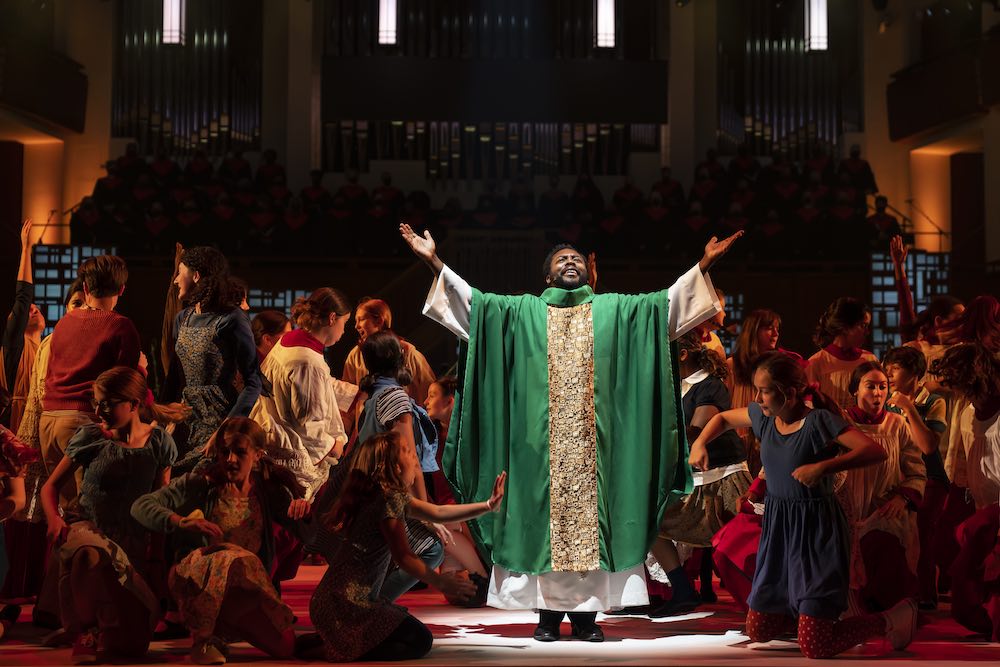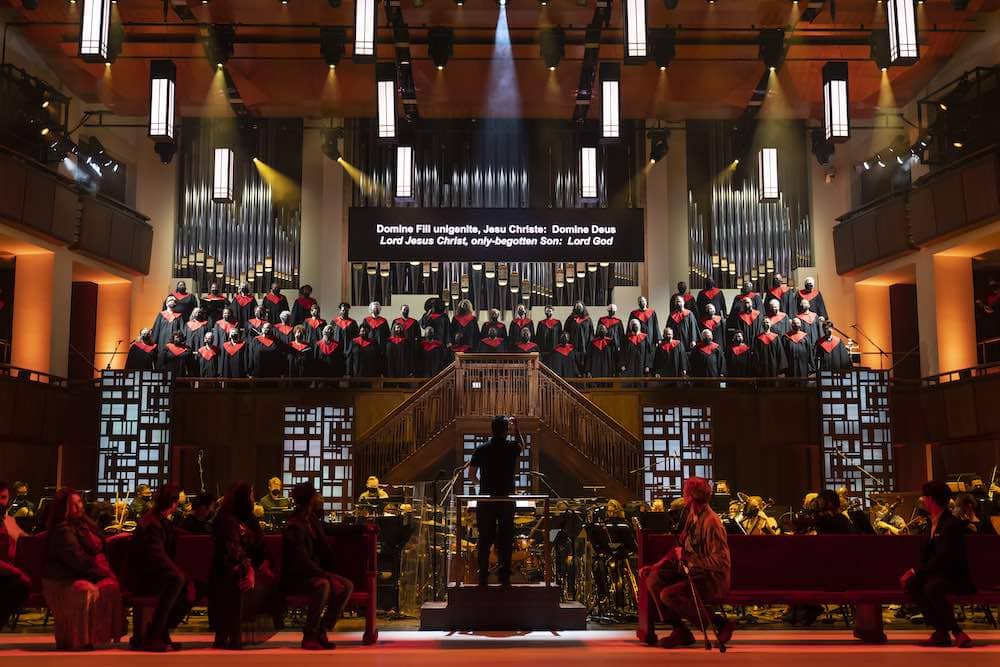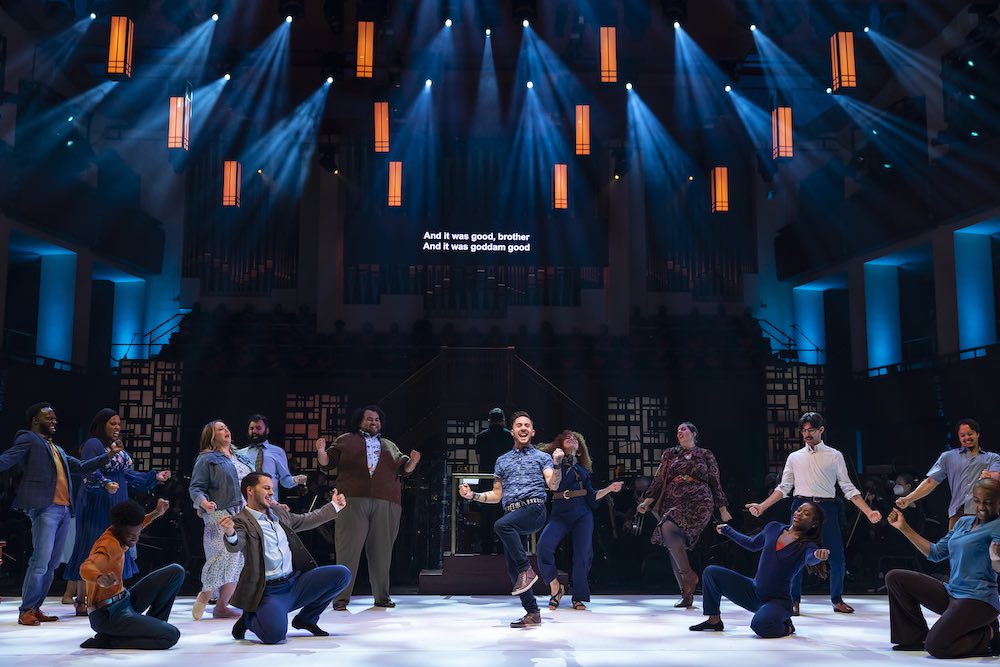The Kennedy Center opened in 1971 with a performance of Leonard Bernstein’s Mass: A Theatre Piece for Singers, Players and Dancers in the Opera House. Now 51 years later, the Kennedy Center undergoes a historic weekend as its inaugural show is staged once again for the venue’s half-century anniversary.
Leonard Bernstein’s rarely performed, perhaps infamous Mass is based around Roman Catholic liturgy, using the liturgy itself — in Latin, with the “Sanctus” portion including some Hebrew — as a structure for discussing the joys, truths, and conflicts inherent in Catholicism, Christianity, and organized religion as a whole. The libretto combines this traditional liturgical text with additional lyrics by Stephen Schwartz, the lyricist and composer behind Godspell and Wicked. This new performance features choreography by Hope Boykin, who builds on the original work of the legendary Alvin Ailey in the premiere performance. (Boykin recently completed her 20th and final year with the Alvin Ailey American Dance Theater.)
Jackie Kennedy commissioned Mass as the piece that would inaugurate the Kennedy Center. The work would commemorate the United States’ first Roman Catholic president while alluding to a variety of subjects relevant to the country in 1971 and throughout the totality of its history: how should principled citizens go about treating others, and themselves, especially when reality and practicality make virtuous behavior difficult, rare, unpopular, and even politically disadvantageous?

Bernstein declined to contribute any analysis of his work to the original performance’s program, writing instead, “As to any further program-note of an analytical nature, I hope that none is necessary, since the intention of Mass is to communicate as directly and universally as I can a reaffirmation of faith.” A “reaffirmation of faith,” indeed — a sentiment can help guide today’s audiences of Mass as they interpret Bernstein and Schwartz’s work, and interpret the piece for themselves, perhaps in relation to their own faith journeys.
Mass was negatively received and highly controversial upon its debut. President Nixon was, in fact, warned by the FBI not to attend, on account of the show’s containing — according to Leonard Bernstein’s official website — “coded anti-war messages.” The FBI also noted that Bernstein was plotting to “embarrass the United States government.” There is certainly commentary afoot relevant to audiences then and now regarding the importance of compassion, empathy, and the necessity of struggle in the fight toward peace as the United States faces another period of strife from both internal and external forces. It is no wonder that Jackie Kennedy and then–Kennedy Center leadership felt it a fitting piece to introduce the Kennedy Center, even if it is an avant-garde, startling one. The piece contains soaring melodies — think West Side Story’s “Tonight” — alongside jarring, unsettling cacophonies — think West Side Story’s “The Rumble” and “Cool” — to communicate the chaos of living as a person attempting to be virtuous and rational in a broken world. Classic Bernsteinian syncopation and percussiveness make this fiery disorder a force to behold.

Upon seeing Mass in 2022, I certainly agree (with the FBI, I guess) that the show contains messaging regarding the universal importance of peace and empathy. However, when viewing it today — when there are still plenty of wars, geopolitical and cultural alike, going on — the show feels far more centered on issues that people face in their everyday lives as they navigate a complex world. The narrative centers on the steadfast Celebrant, played by Will Liverman in a tour-de-force performance, who leads the fickle Congregation for the show’s first hour and a half with heartfelt conviction. Even as the Congregants openly question God and the core of Christian teaching, the Celebrant brings them back down to Earth — back up to Heaven, more like.
Later on in the narrative, the Congregants rise up yet again, this time turning their grumbling skepticism into rebellion as they seize Communion materials and lay tumultuous waste to the pews. Their core concern is the lack of direct answers provided by their faith. “We’ve got quarrels and qualms and such questions. Give us answers, not psalms and suggestions,” they incant. “Give us peace that we don’t keep on breaking. Give us something or we’ll just start taking! We’re fed up with your heavenly silence.”
The Congregation’s plain-English colloquialisms like this throughout the show, which often take the form of open questioning of the value of Christianity and God in their lives, stand in sharp contrast to the traditional Latin liturgical verses sung by the Celebrants. The Celebrant tolerates their rebellion for some time, but they ultimately shatter his resolution. He breaks from his role as a pillar of constancy and enters into madness — a state of chaos that he and the Congregants must face together.
Based on production photos of Mass’s original performance, it certainly appears that director Allison Moritz has brought needed diversity to the cast, adding a wider range of racial identities and body sizes to the collective of Congregants compared with the original performance. Given that they serve to represent the American people, and their diversity of thought and perspective across religious traditions, this is a welcome and narratively requisite change. Will Liverman’s performance is masterful, startling in its conviction. From a storytelling perspective, Liverman’s operatic belt is particularly captivating when he sings Schwartz’s lyrics that represent the mundane chaos of today’s reality.

A few minor issues with audio were occasionally noticeable at Thursday night’s performance, but these are easy fixes. There were also some issues with the lyrics — projected on a screen above the stage as is standard in opera — occasionally not being synchronized with the singers, especially in the second half. Also an easy fix.
Mass enables DC residents and performing arts enthusiasts to reconnect with the Kennedy Center’s roots, and witness an updated exploration of issues that were as culturally pertinent today as they were 51 years ago, if not more so as political movements again call into question the use of religion toward political ends. As a performance in itself, though musically jarring, Mass provides comfort to Christians and others of faith who wonder how to conduct themselves amid complex social and political realities.
Running Time: Approximately two hours with no intermission.
Leonard Bernstein’s Mass will be performed two more times — September 17, 2022, at 8 p.m. and September 18 at 3 p.m. — in the Concert Hall at The Kennedy Center, 2700 F Street NW, Washington, DC. Tickets ($39–$109) are available at the box office, online, or by calling (202) 467-4600 or (800) 444-1324.
The program for Leonard Bernstein’s Mass is online here
COVID Safety: Masks are required for all patrons inside all theaters during performances at the Kennedy Center unless actively eating or drinking. Kennedy Center’s complete COVID Safety Plan is here.
Leonard Bernstein’s Mass
National Symphony Orchestra
James Gaffigan, conductor
Alison Moritz, director
Hope Boykin, choreographer
Will Liverman, the Celebrant
Heritage Signature Chorale
Children’s Chorus of Washington




